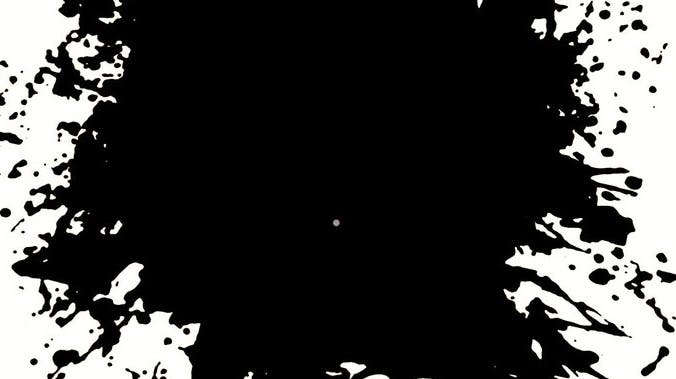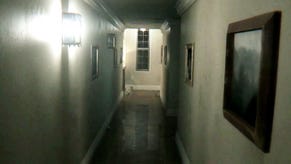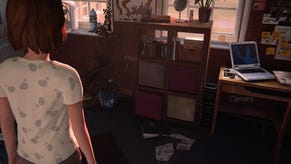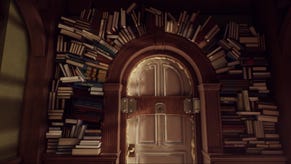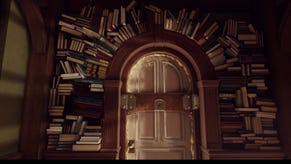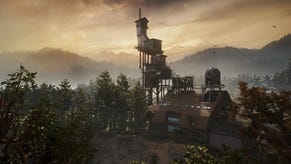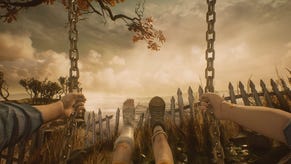Death and chaos with Edith Finch and The Unfinished Swan
Talking surrealness and development with Giant Sparrow's Ian Dallas.
A short while into What Remains of Edith Finch, you come to a beach. It's night, but you can still make out the silhouette of something, half sunk, against the horizon. You'll probably want to check that out, you think, but not now - no boat, no way to get there, too far out - so along the little beach you go. Waves wash and lap, lights from some other town star the stretch of distant coast, the moon lacquers the ocean, and a memory lingers of the last story you saw, grim and only just finished, in a black tunnel from which you've just emerged. Your diary wonders something aloud: maybe it would be better if this all died with you.
It doesn't, and on you go, through some rubble and nonsensical debris - a totem pole? - through lingering memory, to the path off the beach at the other end. A flight of stairs made of stone, which leads to another flight, made of wood, which leads to wherever you must go next. You walk up the stone stairs and wonder aloud again about your family's obsessions, and about being lost, about the reader, your as yet unborn son, being lost too, and maybe you get a little lost there yourself - because it's dark, and it's hard to see, and there's a jetty that looks promising, half-leading back out to the ink but only ending nowhere. And then you find your way up the wooden stairs which must be the right way but climb, at first, into near total black, another tunnel in the open air. At the top of those stairs, at last, at the end of such a short beach, is light - a gate, waist-high and painted white, which you open and walk through and ignore, hearing more of your thoughts and looking forwards for your next path.
That gate caused such an argument at Giant Sparrow, the studio behind Edith Finch and Unfinished Swan, that it almost reduced Ian Dallas and the team to tears.
And therein lies the fun of talking to him. You go into these conversations, I find, looking for a nicely tailored line. The joy of someone like Dallas is that he's everywhere, all over the place, and the magic is when you see that in the games that he and the rest of Giant Sparrow make - The Unfinished Swan to an extent but more with Finch. The joy is less in finding a straight line than untangling a knot. Dallas' charming scattiness is a reminder, really, that there is immense, unmatched complexity to making games - but more pertinently it's that the complexity, the absurdity, is also the point.
It seems so simple. Giant Sparrow's games are, in Dallas' words, about exploration. "To me," he says, "that is the core experience that I've had in my real life that I am trying to evoke in games." A sense of exploration, he believes, is how you get to wonder, and to a kind of uncovering of the unknown, and to the feeling of discovery. He's proud of it. It's the only thing in these games, he says, "that's sort of naturally there, in the fabric of the game experience."
The problem is - of course there's a problem - to get a sense of exploration you need a sense of freedom. And managing freedom is hard. Too little freedom and you're on rails, but too much? "Paralyzing... people tend to turtle up - they retract, instead of opening up, they feel an anxiety about where they should proceed."
The problem with the gate, then, is a problem of exploration and of freedom and of all these big ideas reduced down to the mechanism of a latch: the argument was related to whether or not, when you walk through it after climbing those wooden stairs, it should close behind you and lock. The team initially left it open, such was their instinct for maximising freedom, always, but soon encountered a snag. "Watching playtests," Dallas explains, "people would spend 45 minutes going back down those stairs, and going all the way back - like way beyond where they should have been going - to no event, just to no end, when we knew that they wanted to keep progressing. They didn't mean to be going back."
It's a recurring issue. Dallas talks about The Unfinished Swan in the same way. It's just arrived now, eight years after release, on PC and iOS, but it's arriving in a different climate. As Dallas puts it, "the people are different, and their expectations are different. The game is very much the same." Its finest moment remains its beginning: it begins, and you don't even know. The screen fades to white and you expect a title or a hint, even just a prompt to press a button, but nope. Just blank, and blank still until you find the right button to press and lob your first blob of paint. The splatter gives life, and you're away.
And then after a few minutes: footsteps, painted yolky gold, pointing the way without your help. Early on Dallas resisted that - "Pretty strongly."
He describes to me those footsteps and the other occasional metal objects that stand out in the world as a kind of "handhold". But it's the same lesson again. "I thought it would be a more intense experience of the unknown, to have people go in fully blind. But it wasn't until we put the swan footprints in, and those towers in the distance or whatever, that we felt like people could relax enough to actually have a playful experience of the space and try things out."
Back to Edith Finch, and what happens? You cross the beach, you climb the steps, you hear your voice, you go through the gate, it closes behind you - and for no real, explainable reason: yes, it locks.
It works beautifully, at least to me. And you can tell Dallas doesn't love it. "Hopefully no one notices" - and most people don't, I should add - "because we've got all these other things that are drawing your attention away from it, it's that type of clunky contrivance, to prevent some percentage of players from ruining their experience - and unfortunately, I think when someone ruins their experience, it's gone. We spend so much effort building up this fragile bubble, it's like we're serving them a lovely meal and one of the appetisers has a cockroach in it. That's it! They're out of the restaurant at that point. The fiction, the fantasy, it's broken."
What you learn is Dallas likes problems - or at least he's easily consumed by them. Maybe inspired by them. I'm curious, during our conversation, to know about his other inspirations. What influences someone who works in a team that makes games like these? What's he reading and playing? Any games? Books? Ueda? Pynchon? Gravity's Rainbow is on the shelves of the Finch house. Multiple copies.
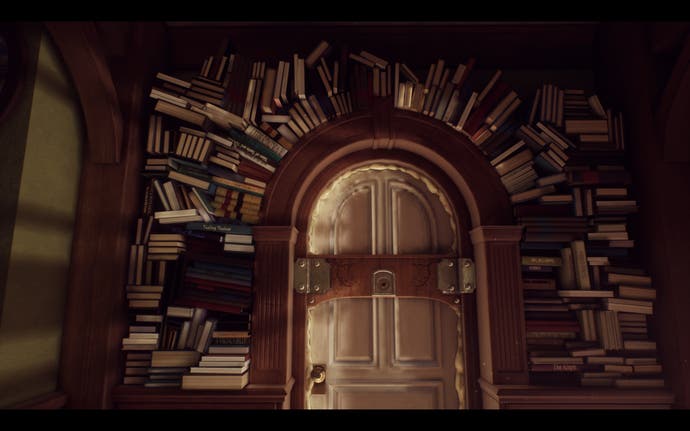
Guess what? It's not that simple. Gravity's Rainbow is "on the list - I will bump that up, out of deference!" He enjoyed A Short Hike, "mostly because of the editing," A Mortician's Tale and Windosill - "anything by Vectorpark". Basically anything short. "There's something really powerful about having a game that is not too short, not too long, so just as you're starting to be kind of full of it, it's out!"
I'll try a different approach. What's he chewing over, then, what's he thinking about or trying to solve? At this point I'm leading him into problems myself. A production anecdote - at least it's a good one.
Some time into production - we're on Edith Finch again - the team at Giant Sparrow finds that Sony wants the game done by a certain date. So, anticipating a rush before the deadline, they bring on a load of extra people to the team - only, at that point there's not much work for them to actually do. "I was constantly trying to figure out what the game was that we were making, while also trying to find enough solid work for other people to make.
"So that's actually why we ended up with a super-detailed house. We didn't know what the other stories were going to be yet, but we knew we we're gonna have a house, so whenever we got stuck we just had the artists make more props - and as you can obviously see, we got stuck a lot because that house got quite detailed by the end of it."
It's a strange idea, making a game where you play the last moments of a dozen or so dead people's lives. The first time I entered the Finch house I remember all I wanted to do was leave. It's a cramped building, claustrophobic, dark - massive, by house standards, but inside it's locked up, folded inwards, and so oppressively small.
Honestly, I hate it. I hate this house, and I'm sure I'm not supposed to, but I enter that house and all I can think of is leaving, each story plays and all I want is it to end. But the only way out is through the other side, so off you go. You eat yourself to death, and you swing yourself off a cliff, and you shove your head, if I'm remembering this right, under some kind of mechanical fish cleaver. And it's magic, because as you edge your way through this unequivocal nightmare you start to pick up a kind of momentum, and you wonder what's next and how much more ridiculous it can get, and the ridiculousness is everywhere. How many more family photos do you need on that wall by the stairs? How many more locks? And secret entrances? And books - why so many books?!
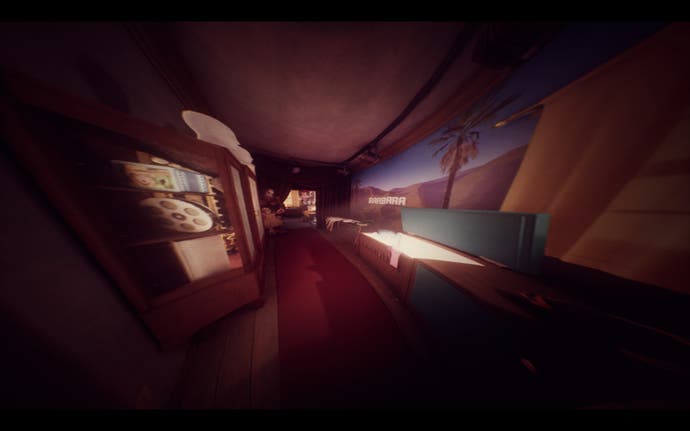
And you learn now, of course, that a lot of it is an accident. There's clutter because a bit of a mix up in development. There's story, but the story itself is almost an accident. It's "crucial," Dallas says, but also, he tells me, that he wouldn't think about story at all, if he could get away with it - that of all the time this game was in production the story made up maybe "ten per cent". Accidents. Little absurdities and contradictions, patches over unseen problems that just manage to line up. But line up they do, to a great mechanical structure, immaculate as clockwork.
And full of death. I'm most curious, above all, about what Ian Dallas thinks about that. This is a game with Pynchon on the shelves, after all. Pynchon who says, "When we speak of 'seriousness' in fiction ultimately we are talking about an attitude toward death - how characters may act in its presence, for example, or how they handle it when it isn't so immediate."
You can model some extra flower pots by accident but death, I think, as a major theme of your games doesn't happen by accident. It's central to The Unfinished Swan, remember: a story of an orphaned child wandering alone through some snowglobed abstraction. It's in the walls of Finch.
And death is where Dallas opens up. "I think death is a recurring thing that I think about a lot because it's the most absurd aspect of our reality.
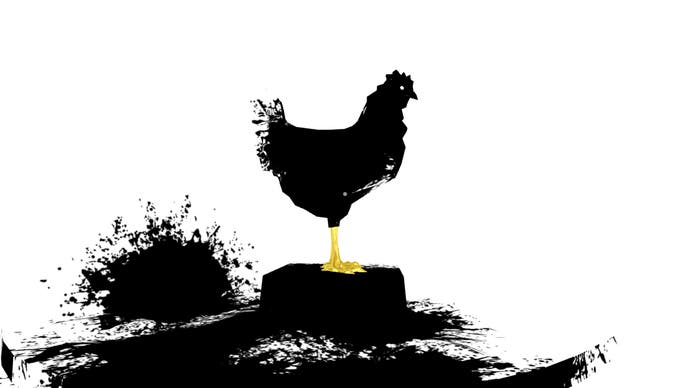
"That it will end and that we can't actually really think about it consciously very often, because we get so easily distracted - and because you wouldn't be able to survive if you were always thinking about that.
"I think I am, really, interested in surreal experiences, and death to me seems like the most surreal aspect of our shared experience. There's an old, I think it's a Persian quote, about how strange it is that every man looking around sees others die but never thinks that he will die. There's some truth to that, that it never quite sinks in that we're gonna die. No matter how much we consciously know about it, there's other parts of us that just don't acknowledge it. So, as someone just very interested in the surreal, I think I'm drawn to death because it is the most surreal."
Sometimes, as with video games and as with death, the answer is complicated, and what helps is to remember the absurd.
The next thing Ian Dallas is making is about animation. After Edith Finch released in 2017 he unplugged (Annapurna Interactive has been handling the Unfinished Swan port - "I would say the process has been ideal, in that I have done none of it.") and so went travelling and eating around the world. "I'm surprised there isn't more food in my games," he laughs, before remembering that lengthy scene about crunching down on rabbits as an owl.
After travelling Dallas returned to school, to learn animation. "What I have realised is that as a designer, the thing that I enjoy most is learning. I think about all these games as a chance for me to learn new things about the world and how I react to it - and also how to make more interesting things."
The animation will play into body language, he tells me, and how you read it and interpret it. There might be giant creatures, because they add a sense of proper threat - "a little cheap," he says, "but we're just using all the tools we have."
It'll also, like Edith Finch and to an extent Unfinished Swan, be "a bunch of smaller, interesting explorations of mechanics," rather than a single one at its heart. "I don't know if there's going to be a central mechanic. I mean, I wish - that would make it a lot easier. No, I think it's going to be a collection of stories like Edith Finch. I'm sceptical of having a central mechanic because I think it's hard to make a game that goes so deep on one mechanic that doesn't become about challenging players to get good at that mechanic. And I'm just not interested in challenging players."
Good, I think. This way it's much more likely to be absurd.
